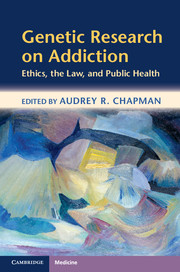15 - Summary and recommendations: Ethical guidance for genetic research on addiction and its translation into public policy
from Section 4 - Conclusions
Published online by Cambridge University Press: 05 September 2012
Summary
The contributions to this volume identify ethical considerations implicated in genetic research on addiction and their translation into public policy. This chapter draws conclusions and proposes specific recommendations to guide research practice and help shape policy development based on this analysis. It should be noted that the views expressed in the summary and recommendations represent the views of the three authors of this chapter and may not necessarily be those of the authors of the rest of the chapters in this volume. The guidance is organized into four sections: (1) conceptualizing addiction; (2) the limitations of behavioral genetics in general and addiction genetics in particular; (3) research ethics; and (4) the translation and interpretation of addiction genetics research.
Conceptualizing addiction
The manner in which addiction is conceptualized has been a controversial topic, with implications for the treatment of affected individuals and for social policy. Addiction is usually thought of as comprising a combination of three characteristics: physical dependence (e.g., physical symptoms of withdrawal and tolerance), psychological dependence (e.g., drug cravings), and harmful use. Most addicts will exhibit all three, but the manner in which they are manifested at different points can vary significantly. For example, it is possible to be addicted to largely nonharmful substances, i.e., caffeine. There are also forms of addiction that do not entail significant physical dependence: pathological gambling, for instance, is a harmful pattern of gambling that primarily involves psychological dependence. Conversely, substances may be used in ways that cause considerable acute physical and social harm in the absence of either psychological or physical dependence (e.g., alcohol-induced violence, drunk driving). It is also possible to develop a physical dependence to a substance in the absence of psychological dependency. For example, the administration of opiates by a physician or other third party, often in the treatment of pain, may lead to physical dependence (e.g., tolerance to the pharmacological effects of opiates necessitating increasing doses to maintain the same analgesic effects or adverse withdrawal symptoms following abrupt cessation of opiates), but no psychological dependence (i.e., no psychological need to use a drug post-detoxification).
- Type
- Chapter
- Information
- Genetic Research on AddictionEthics, the Law, and Public Health, pp. 232 - 245Publisher: Cambridge University PressPrint publication year: 2012

